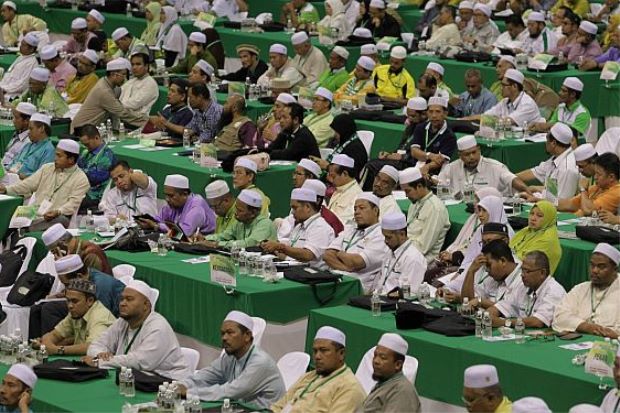
PAS members attending the 59th muktamar at Stadium Melawati in Shah Alam. – Filepic
It is simply wrong for anyone to suggest that non-Muslims have no right to debate on the hudud issue on the basis that they do not understand Islamic laws.
ONE of the biggest misunderstandings in the current debate on the push by PAS to implement hudud in Kelantan is that it will not affect non-Muslims, and that being the minority, they have no say on the matter.
This line of argument ignores the fact that Malaysia is a multi-racial and multi-religious country. Nothing is isolated within one community itself.
Hudud is essentially the Islamic penal code and because a crime can be committed by anyone, Muslim and non-Muslim alike, there are bound to be consequences on how any criminal offence will be handled.
In the case of rape, what if the victim and the accused are of different faiths? How would such cases be tried and under which law? Must a non-Muslim victim bring four reliable male witnesses to prove her case against the Muslim accused if the case were tried in a syariah court?
And what if two buddies, one Muslim and one non-Muslim, are charged with robbery? How will the sentence be meted out, and in which court?
There can never be two sets of penal laws in this country, where hudud can be implemented in Kelantan or Terengganu, for example, while the rest follow the federal Penal Code.
Is PAS also saying that if it were to form the federal government, hudud laws would be implemented entirely?
It is simply wrong for anyone to suggest that non-Muslims have no right to debate on this issue on the basis that they do not understand Islamic laws.
Worse, there are non-Muslim groups who naively believe that non-Muslims are not involved at all. They are either being politically misty-eyed or simply reluctant to enter the fray. Or they do not want to oppose the move by PAS because of political expediency.
Then, at the other extreme, there are groups like the Ikatan Muslimin Malaysia (Isma), whose president Abdullah Zaik Abdul Rahman was quoted as saying that “non-Muslims in the country have no right to oppose the plan to implement hudud and they should understand that there are limitations to what they could say”.
Non-Muslims, said Abdullah, “should be thankful that they have more than what they need in this country”.
“I don’t see what their contributions are for them to be given so many privileges in the first place,” he had reportedly said, adding that “their strong stand against hudud gives the impression that they are in a dream world; they must realise that they have no say in determining the future of Muslims in this country.”
Even without hudud, we have already seen how complicated it can be in conversion cases as well as marital disputes involving Muslims and non-Muslims due to jurisdictional issues of the civil and syariah courts.
Until now, we have not seen how the authorities intend to resolve the case of a Muslim convert who has taken away his son from his Hindu wife, whom he has divorced.
The civil court granted a custody order to the Hindu wife while the syariah court issued the same order to the Muslim ex-husband. And the police have said they are caught in the middle as both orders are binding.
After all, the Federal Constitution states clearly that the civil and syariah courts have equal status but perform different functions.
If we extrapolate further, what about business disputes and cases of criminal breach of trust? People of different faiths work together, and they are bound to be involved in such issues at some point.
Surely all Malaysians have the right to ask how these cases would be dealt with?
There are existing laws to deal with these issues, but what if hudud also comes into play?
What if different parties opt to go to different courts, insisting on their religious rights and obligations?
There is plenty for PAS to explain, even if Kelantan is predominantly Muslim and the state government is controlled by PAS, because the stakeholders are not just Muslims.
If its partners in Pakatan Rakyat claim they are not aware of what the Islamist party is up to, then the implications are even more serious.
In Selangor, where PKR leads, the state religious authorities have seized Bibles which carry the word Allah and the state government is powerless in dealing with the issue.
The state religious body, in short, has become more powerful than the Mentri Besar and the other state executive councillors who appear to be sending out the message that there’s nothing they can do.
One lesson that has emerged is that when it comes to religious laws, there are some who will conveniently shut down any argument or dissent from non-believers, simply on the premise that they have no such rights or understanding.
But with secular laws, opposing sides can bring any matter to the open court and argue their cases. Fight to keep Malaysia secular, that’s the only choice to keep the country moderate.





